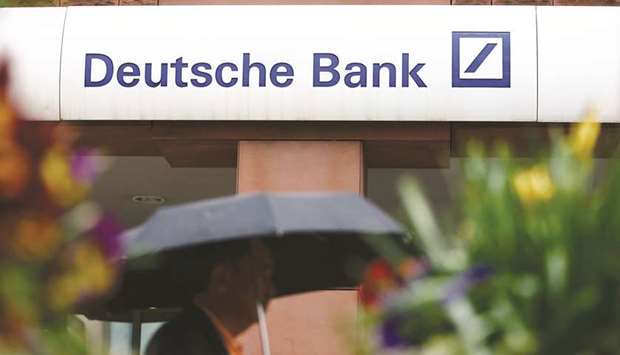Deutsche Bank yesterday swung to a surprise net profit in the third quarter as it shook off losses driven by the coronavirus pandemic and ploughed on with a wide-ranging restructuring.
Germany’s largest lender posted a net profit of €182mn ($214mn), compared with a loss of €942mn in the same period of the previous year.
The results beat expectations for a loss of €82mn, based on a survey by FactSet, as Deutsche Bank started to move on from years of poor management and overblown investment banking ambitions with a transformation plan that launched last year.
“Our more focused business model is paying off,” the bank’s chief executive Christian Sewing said. “We not only demonstrated continued cost discipline, but also our ability to gain market share,” Sewing added.
Last year, the bank said it would cut 18,000 jobs, and figures released yesterday show that it has already shed around 3,000 positions.
Deutsche said in September that it would shutter around 100 branches, cutting its high-street presence by a fifth, “reflecting changes in customer behaviour patterns”. For the nine months to September, net profit was €62mn, compared with a net loss of 4.1bn euros at the same point in 2019, when early provisions for its restructuring hit the business.
Deutsche Bank kept its 2020 outlook, as it lowered its provision for loan losses compared with the lockdown-hit second quarter.
The Frankfurt-based institution set aside €273mn, 56% more than last year, but significantly less than €761mn in the three months to June when pandemic-induced restrictions closed businesses and factories.
The group’s third quarter results were once again driven by investment banking, which brought in €2.4bn, up 43% year-on-year.
Boeing
Boeing Co reported its fourth straight quarterly loss yesterday as the coronavirus pandemic and 737 MAX grounding continued to hammer sales, while reaffirming its expectation that US deliveries of the jet would resume before year-end.
The US plane maker also said it was sticking with the deeply reduced twin-aisle production rates announced in July, as well as the goal to hit a build rate of 31 narrowbodies monthly in early 2022.
“While losing money and burning through over $5bn in three months is hardly good news, at least it wasn’t worse than this,” Vertical Research Partners analyst Rob Stallard wrote in a note.
Chief financial officer Greg Smith said Boeing is ready to cut 787 production again if needed as some analysts questioned why Boeing did not cut production sooner, resulting in a stockpile of 50 undelivered jets.
European rival Airbus says it is producing 5 of the competing A350 a month and industry sources say the actual production rate has slipped to just 4.5 a month.
Earlier on the call, chief executive Dave Calhoun said he expects to win 737 MAX approval in time to resume deliveries in the fourth quarter. He also said Boeing has lost some single-aisle market share to Airbus but was not going to give up any ground in future competitions.
Calhoun expects airline traffic to end the year at around 30-35% of 2019 levels, with a return to pre-pandemic levels in about three years – more optimistic than some industry estimates.
The US Federal Aviation Administration was expected to lift its March 2019 grounding order on the 737 MAX as soon as next month, pending approval of software and training changes, meaning the jet could return to service in 2021.
Chief financial officer Greg Smith told analysts he expects that half of the roughly 450 already built and stored MAX jets would be delivered to airline customers by the end of next year, with the majority of remaining jets handed over in 2022.
Boeing also announced a $67mn charge in the quarter on its KC-46 aerial refuelling tanker programme, which Boeing attributed to Covid-19 disruptions and production issues. The company’s free cash outflow rose to $5.08bn in the quarter, from $2.89bn, a year earlier, while total debt jumped to $61bn, from $19.2bn.
Excluding items, Boeing lost $1.39 per share, less than the Wall Street’s average expectation of a loss of $2.52 per share, according to IBES estimates from Refinitiv.
Revenue fell 29% to $14.14bn, but topped analysts’ estimate of $13.90bn.
Mastercard
Mastercard Inc said yesterday it does not expect a pickup in overall travel spending anytime soon, warning that a recovery in cross-border volumes would be tied to the timing and the availability of Covid-19 vaccines.
The payments processor said the impact of the pandemic on international travel, especially outside Europe, remains significant.
The comments echoed sentiments of American Express, which last week reported a 40% fall in quarterly profit and warned business travel would not recover before early 2022.
“While we believe that cross-border will ultimately recover, it will take time for people to build their confidence in the safety of travel,” Mastercard’s finance chief Sachin Mehra told analysts on a conference call.
“We believe that is tied to the broad availability of vaccines and therapeutics, likely towards the latter part of next year,” he said.
The pandemic has forced companies to lay off workers by the millions, hurting their spending power, and the hit to air travel has also taken a toll on cross-border card transaction volumes.
Mastercard reported a 36% drop in cross-border volumes on a local currency basis, with the first three weeks of the current quarter clocking declines of more than 30% each.
Chief executive officer Ajay Banga, however, pointed to “some” improvement in domestic travel in the quarter, including spending on lodging and sports.
Banga, who took charge just after the 2008-09 financial crisis, was speaking to analysts on his final earnings call before his transition to the role of executive chairman next year.
Mastercard’s net income fell 28% to $1.5bn, or $1.51 per share, in the third quarter ended September 30.
Excluding items, profit was $1.60 per share, missing Street estimates of $1.66, according to IBES data from Refinitiv.
Net revenue fell 14% to $3.8bn, while gross dollar volume, the dollar value of transactions processed, rose 1% to $1.6tn.
Purchase volumes rose 2%, returning to positive territory.
The company forecast growth in US retail sales excluding automotive and gas of 2.4% during the holiday season, with spending mainly on home furnishing, athleisure, clothing and electronics.
GSK
Britain’s GSK said yesterday it expects full-year adjusted earnings to come in at the lower end of its forecast as the Covid-19 pandemic disrupts vaccination rates, especially for its blockbuster shingles vaccine.
Shingrix, the biggest driver of sales growth last year, saw its quarterly revenue fall 30% from a year earlier to £374mn, coming in 18.5% below market expectations.
The drug maker said the Covid-19 pandemic has impacted its businesses, particularly its vaccines unit, during the first nine months of 2020.
GSK said it now expects 2020 profit to be at the lower end of its forecast of a 1%-4% drop, which did not include any potential impact from the coronavirus crisis.
The drugmaker, however, said it had seen a recovery in vaccination rates, including adult immunisation rates in the United States returning to prior year levels in the last month of the third quarter.
For the quarter, the company reported adjusted earnings of 35.6 pence per share and sales of £8.67bn.
Analysts on average expected third-quarter adjusted earnings of 30.4 pence per share and sales of 8.77bn pounds, according to a company-compiled consensus of 16 analysts.
Bankia
Bankia’s third-quarter net profits plunged yesterday after the Spanish lender set aside another €155mn to cover the risk of customers defaulting on loans, which have multiplied during the pandemic.
Third-quarter figures showed a net profit of €37mn, down 79% on the same period last year and well short of the €46mn expected by analysts surveyed by financial information service Factset.
Last month, the bank agreed to merge with its biggest rival Caixabank to create Spain’s largest domestic lender, transforming the national banking landscape.
In total, the bank said it set aside €465mn in exceptional provisions during the first nine months of the year, a step taken by most European banks to cover themselves against people and firms defaulting on loans due to the economic crisis.
Bankia said it had granted a moratorium on mortgages worth €4.1bn in a move encouraged by the government, which is the bank’s largest shareholder.
The state currently holds a 61.8% stake in Bankia but after the merger, that will drop to around 16%. Shareholders from both banks are to meet in early December to approve the merger which should be finalised by the end of March.
General Electric
General Electric reported a smaller quarterly loss yesterday on lower revenues and a continued slump in aviation, but said it would be cashflow positive in 2021 following cost-cutting moves.
Shares of the industrial giant pushed higher in pre-market trading despite some negative points in the earnings report, including a third-quarter drop in orders in all four of its business segments.
GE chief executive Larry Culp said the company had boosted profit margins in every segment except aviation when currency effects were stripped out.
“We are managing through a still-difficult environment with better operational execution across our businesses, and we are on track with our cost and cash actions,” said Culp.
GE reported a loss of $1.2bn in the quarter, compared with a loss in the year-ago period of $9.5bn that was inflated by a one-time non-cash loss.
Revenues fell 17% to $19.4bn.
Demand for GE’s products remains under pressure amid a global economy slowed by the coronavirus outbreak.
GE’s aviation segment has been especially hard-hit due to a downturn in airline travel that is not expected to fully recover until there is a widely available vaccine for the virus.
But Culp has taken actions to improve GE’s cash position and business performance, including reorganising the power business, cutting $2bn in costs and announcing it was eliminating 13,000 jobs in the spring. During the quarter, GE said it began to launch the world’s largest offshore wind farm, won federal certification for a new fuel-efficient plane engine and introducing new health technology products.
Finnair
Finnish flag carrier Finnair PLC reported a second consecutive quarterly loss yesterday and said the final quarter is likely to yield a similar result because of restrictions on movement imposed to curb the Covid-19 pandemic.
“Travel restrictions, which are particularly strict in Finland, led us to deviate from our plans and we continued to operate a restricted network throughout the quarter,” chief executive Topi Manner said in a statement.
Finnair, which is 55.9% state owned, made an underlying operating loss of €167mn ($197mn) for July-September.
That compared with a €174.3mn loss in the previous quarter and profit of €100.7mn a year earlier.
The airline said it would increase its cost-cutting target by €40mn to €140mn and reduce headcount by almost 1,100 from levels at the start of the year.
For more savings and to ensure competitiveness after the pandemic, Finnair said it was in talks to remove some index increments from its staff pensions and that the change was pending approval from authorities.
The airline said the planned pension expense reduction, which it has not yet included in its renewed cost cut target, would have a one-off positive impact of at least €85mn on fourth-quarter earnings, without an immediate impact on cash flow.
Finnair said the talks were ongoing and therefore the positive impact on earnings could be significantly higher than €85mn.
“Based on the current assumptions, the revenue and capacity will both decrease more than 70% in 2020 compared to 2019,” the airline said in its updated outlook.
PSA
French auto giant PSA reported third quarter sales yesterday of €15.5bn, down just 0.8% despite massive disruption caused by the coronavirus pandemic.
PSA, which groups the Peugeot, Citroen and Opel brands, said that while it had sold fewer cars in the three months to September it had improved profitability.
Over the first half of the year, PSA saw sales plunge 34.5% to €25.1bn, with net profit down 67.5% at €595mn.
But in the three months to September, as the market recovered in line with some easing of virus restrictions, PSA sold 589,000 vehicles, down 12.7%, while generating revenues of €12bn, up 1.2%.
“We prioritised profitability and generating cash,” the company said.
PSA pledged to stick with its previous 2020 forecasts, putting operating profit at around 4.5% overall for the period 2019-21.
For this year, it expects the auto markets to suffer sharp declines — 25% in Europe, 30% in Latin America, 20% in Russia and 10% in China.
PSA, which is in the process of merging with Fiat Chrysler (FCA), has cut costs sharply over recent years and continues to do so.
Pfizer
Pfizer executives expressed measured optimism on Tuesday over the prospect of providing a coronavirus vaccine in 2020 even as they signaled key data on the vaccine would not be released before the US election.
Pfizer chief executive Albert Bourla said the drug giant could supply some 40mn doses in the United States in 2020 if clinical testing proceeds as expected and regulators approve a vaccine.
“If all goes well, we will be ready to distribute an initial number of doses,” said Bourla, who pointed to a US government contract for Pfizer to supply 40mn doses by the end of this year and 100mn doses by March 2021.
But Bourla said the company still had not reached key benchmarks in assessing vaccine efficacy.
Pfizer previously said it could have the data in October, which might have advanced the process ahead of the November 3 presidential election. “We have reached the last mile here,” Bourla said.”So let’s all have the patience that’s required for something so important for public health and the global economy.”
He said the company expects to file for emergency use authorisation for its Covid-19 vaccine in the third week of November, roughly in line with earlier timetables.
Asked if he was “bullish” the vaccine would work, Bourla said: “I’m cautiously optimistic that the vaccine will work.”
Pfizer reported a 71% drop in profit to $2.2bn in the latest quarter.
However, the comparable period last year included a large gain connected to a transaction.
Revenues dipped 4% to $12.1bn, missing analyst estimates.
Pfizer estimated a revenue hit of $500mn connected to Covid-19 due to lower pharma demand in China and fewer wellness visits by US patients.
The company saw an 11% drop in its hospital business in emerging markets, primarily due to fewer elective surgeries in China and shorter in-patient hospital stays in the country.
This effect was partially offset by increased demand for the Prevnar-13 vaccine for pneumonia “resulting from greater vaccine awareness for respiratory illnesses,” the company said.
Pfizer also cited strong performance in its biopharma business due to good sales for cancer drug Ibrance, anticoagulant Eliquis and other medications.
Microsoft
Microsoft on Tuesday said its profit in the recently ended quarter continued to soar as the pandemic boosted a trend toward business being taken care of in the internet cloud.
The US technology titan’s profit rose to $13.9bn, up 30% from the same quarter last year, according to earnings figures. Revenue in the quarter climbed 12% to $37.2bn.
“Demand for our cloud offerings drove a strong start to the fiscal year,” said Microsoft chief financial officer Amy Hood.
Microsoft took in $15.2bn in revenue from cloud computing offerings for businesses, up 31% from the same period last year, according to Hood.
Demand for software, services, and data storage hosted online at data centres that had been steadily growing for years has rocketed during the pandemic as shopping, learning, work and more are tended to online due to the pandemic.
Businesses are under pressure to engage customers online or lose them, according to Microsoft.
“The next decade of economic performance for every business will be defined by the speed of their digital transformation,” said Microsoft chief executive Satya Nadella.
Revenue was also up from the company’s Office suite of software; LinkedIn career-centric social network, and the Xbox video game unit.
Fiat
Italian-American auto giant Fiat Chrysler said yesterday it returned to profit in the third quarter, doing better than expected as the market recovered from a massive downturn sparked by the coronavirus pandemic.
FCA, due to merge with French peer PSA, reported a three months to September net profit of €1.2bn, more than making up for a massive loss of €1.0bn in the previous quarter.
The carmaker posted a net loss of €179mn in the third quarter of 2019.
Analysts surveyed by financial information service Factset had expected a net profit of €582mn in the third quarter of this year.
FCA, which groups the Fiat, Chrysler, Jeep, Maserati, Alfa Romeo, Dodge and Ram brands, said sales fell 6.0% to €25.8bn, again slightly better than analyst estimates for €25.16bn.
Total vehicle sales came to 1.03mn, down 3.0% overall, reflecting falls of 29% in its Asian markets and 8.0% in North America.
Europe-Middle East unit sales rose 10%.
“In the quarter we were present with various brand products in market segments where we were previously absent,” FCA head Mike Manley said in a statement.
FCA and PSA earlier yesterday reiterated their intention to seal their merger by the end of the first quarter next year.

..


